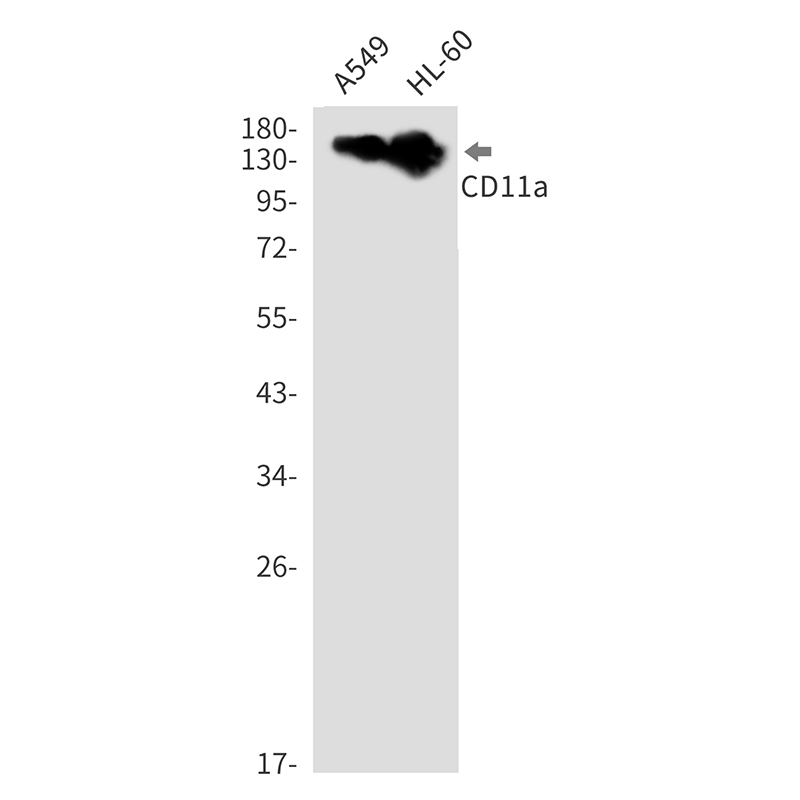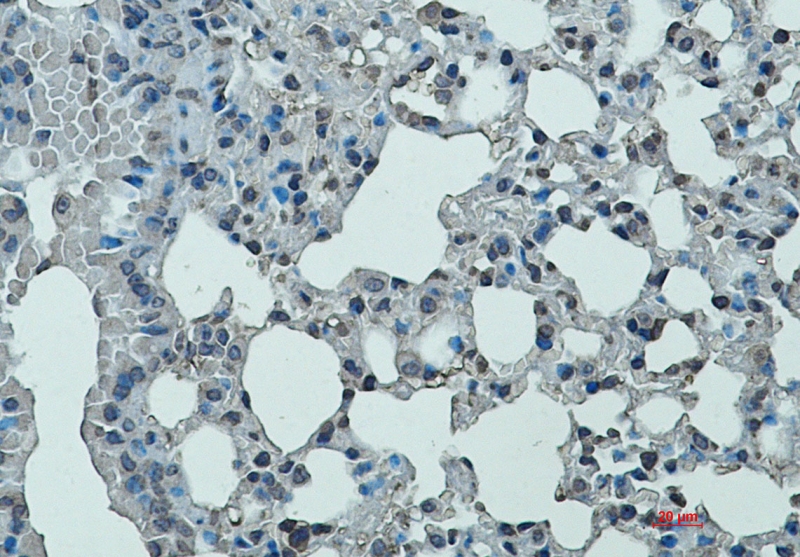

| WB | 1/500-1/1000 | Human,Mouse,Rat |
| IF | 咨询技术 | Human,Mouse,Rat |
| IHC | 1/50-1/100 | Human,Mouse,Rat |
| ICC | 技术咨询 | Human,Mouse,Rat |
| FCM | 咨询技术 | Human,Mouse,Rat |
| Elisa | 咨询技术 | Human,Mouse,Rat |
| Aliases | Cd11a; LFA-1; Ly-15; Ly-21; (p180); LFA-1A |
| Entrez GeneID | 16408 |
| WB Predicted band size | Calculated MW: 128 kDa; Observed MW: 160 kDa |
| Host/Isotype | Rabbit IgG |
| Antibody Type | Primary antibody |
| Storage | Store at 4°C short term. Aliquot and store at -20°C long term. Avoid freeze/thaw cycles. |
| Species Reactivity | Human,Mouse |
| Immunogen | Recombinant protein of mouse CD11a |
| Formulation | Purified antibody in TBS with 0.05% sodium azide,0.05%BSA and 50% glycerol. |
+ +
以下是3-4条关于 **Integrin alpha L(CD11a)抗体** 的参考文献示例,按文献名称、作者和摘要内容概括列出:
---
1. **文献名称**: *"Lymphocyte function-associated antigen 1 (LFA-1): a surface antigen distinct from Lyt-2.3 that participates in T lymphocyte-mediated killing"*
**作者**: Springer, T.A. et al.
**摘要**: 该研究首次描述了 **Integrin alpha L(LFA-1)抗体** 在阻断T细胞介导的细胞毒性中的作用,揭示了LFA-1与细胞间黏附分子(ICAM)的相互作用对免疫细胞迁移和激活的关键性。
2. **文献名称**: *"The structure and function of leukocyte integrins"*
**作者**: Hogg, N. et al.
**摘要**: 通过使用特异性抗体,本文阐明了Integrin alpha L的结构域(如I-domain)在结合配体(如ICAM-1)中的功能,并揭示了抗体阻断对炎症反应中白细胞黏附的抑制作用。
3. **文献名称**: *"Monoclonal antibody blockade of LFA-1 in a humanized mouse model of psoriasis"*
**作者**: Shimaoka, M. et al.
**摘要**: 研究利用抗Integrin alpha L单克隆抗体(如efalizumab)在小鼠模型中抑制T细胞皮肤浸润,证明靶向CD11a可缓解银屑病样炎症,为自身免疫疾病的抗体治疗提供依据。
4. **文献名称**: *"Treatment of chronic plaque psoriasis with anti-CD11a antibody: results of a phase II trial"*
**作者**: Papp, K. et al.
**摘要**: 临床试验显示,抗Integrin alpha L抗体(efalizumab)通过阻断T细胞活化显著改善中重度银屑病患者的症状,但也提示了长期使用可能引发的安全性问题。
---
**注**: 以上文献为示例,实际引用时需根据具体研究需求核实来源。核心期刊如《Nature》、《Blood》和《Journal of Immunology》常收录Integrin alpha L抗体的相关研究。
Integrin alpha L (CD11a) is a critical subunit of the leukocyte-specific integrin LFA-1 (lymphocyte function-associated antigen-1), which pairs with the beta-2 subunit (CD18) to form a heterodimeric cell surface receptor. Expressed predominantly on immune cells, including T cells, B cells, and neutrophils, LFA-1 mediates cell-cell adhesion and migration by binding to intercellular adhesion molecules (ICAMs) on endothelial or antigen-presenting cells. This interaction is essential for immune responses, facilitating leukocyte recruitment to inflammation sites, immunological synapse formation, and T-cell activation.
Antibodies targeting Integrin alpha L are widely used in research and therapeutics to modulate immune activity. In preclinical studies, they block LFA-1/ICAM interactions, inhibiting leukocyte adhesion and migration, making them valuable tools for studying autoimmune diseases (e.g., psoriasis, rheumatoid arthritis), transplant rejection, and chronic inflammation. Therapeutically, anti-CD11a monoclonal antibodies like efalizumab were developed to suppress pathogenic immune responses, though some have been withdrawn due to safety concerns. Current research focuses on understanding LFA-1's conformational activation, signaling pathways, and developing safer biologics or small-molecule inhibitors. Additionally, CD11a antibodies serve as diagnostic markers in flow cytometry to identify and isolate leukocyte subsets. Their dual role as investigational tools and potential therapeutics underscores their significance in immunology and translational medicine.
×